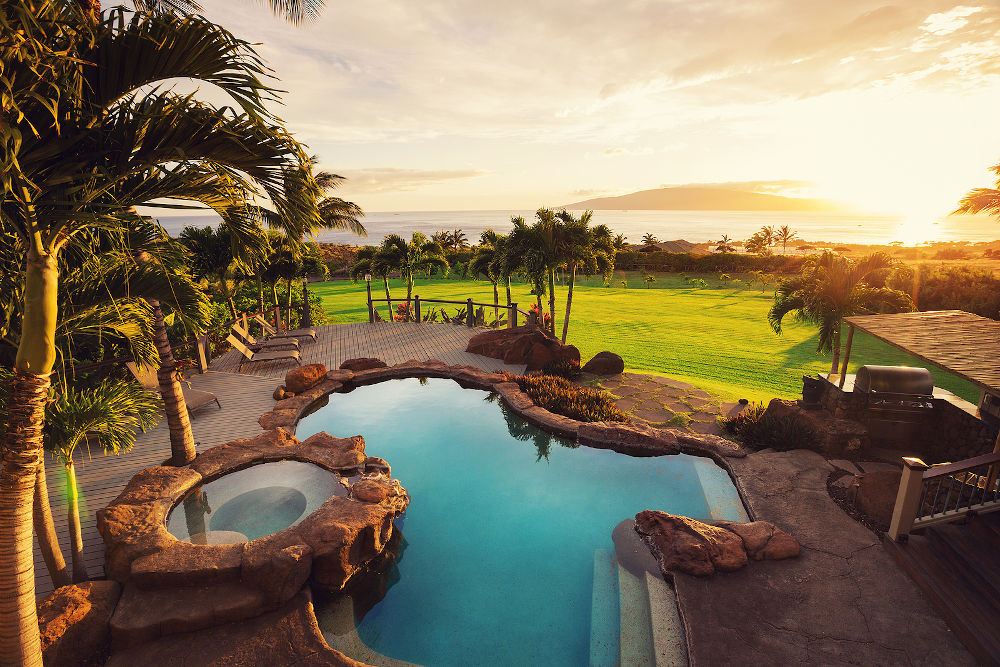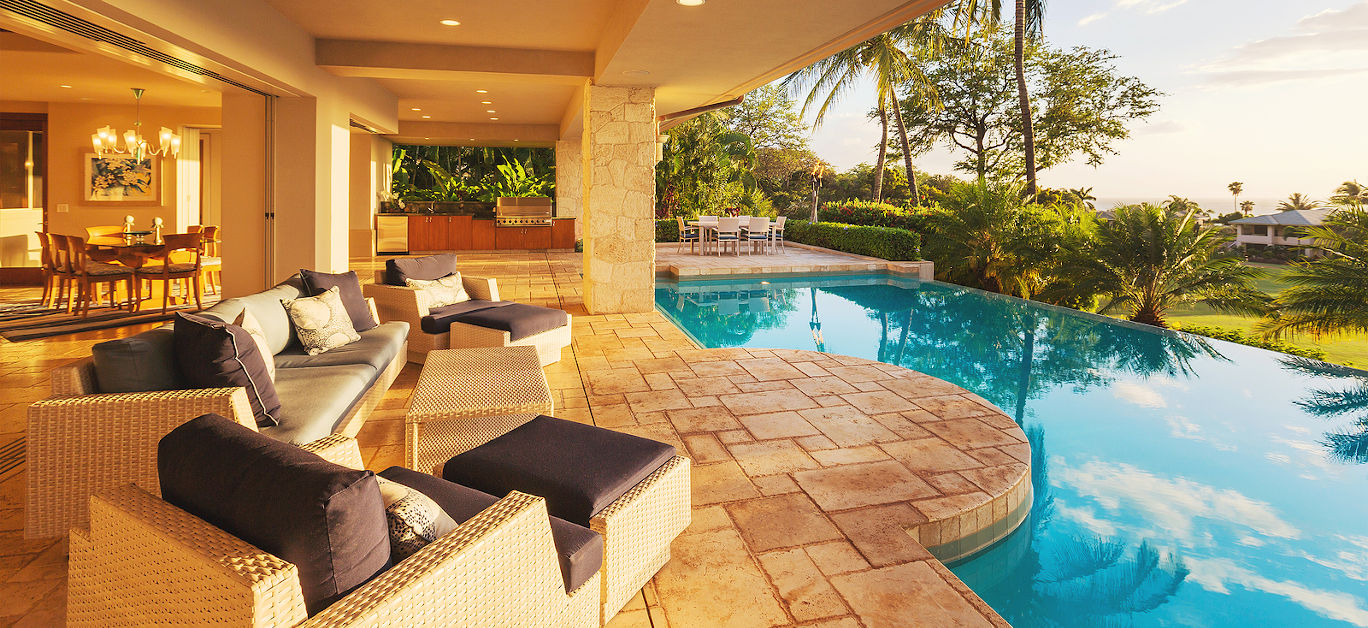Giving your garden a redesign can prove to be rather exciting, especially if you’re looking to incorporate a pool into your new-look space. Though a garden redesign takes a lot of planning, effort and quite a chunk of funds to get it looking like something that should appear on a magazine cover, it will be well worth it once it’s complete.
If a swimming pool is an absolute must for you – why wouldn’t it be? – then there are a host of considerations to take into account before you buy, not least the question of the regular cleaning and maintenance that’s required to keep it in perfect swimming condition. Read on for our complete guide to owning a swimming pool, from choosing and styling to cleaning and maintenance.
Choosing the right pool for you
The most important things you should think about when choosing the right pool for you are the size of your outdoor space and what size pool will best fit, the style of pool to suit your designs and what additions you will need to make in order to have a complete set up that looks fantastic.
You will also need to consider the placement of your pool – the best spot in your garden is where the sun falls during late morning and afternoon and you will want to ensure that you have a private spot where you can’t be overlooked by neighbours.
When it comes to styling, you can choose from a modern, sleek and unfussy offering with a poured concrete surround and neat edges or a tropical pool, which can incorporate palms, slides, waterfalls and boulders with a curved pool design. Mediterranean style pools are also popular – who wouldn’t want to feel transported to the Med each time they step outside? – and they often boast ornate elements such as additional water features, colourful tiles surrounding the waterline as well as aqua colour water.

Once you have a style in mind you can then look to plan the rest of your garden. If you have children or pets, pool fences are highly effective at providing a physical barrier that keeps them away from the pool when it’s not in use, offering an added layer of protection and peace of mind. Take into account a hot tub, lighting, heating, underwater speakers, a sunbathing area, paved, decked and or grass areas, and whether you want a retractable roof that enables you to take a dip when it rains.
Pool maintenance and cleaning
When opting for luxury pool, many people underestimate the level of maintenance involved, but with our simple tips you can make light work of this to leave you with more time to enjoy your surroundings. Like most things in life, it’s very important to take care of your belongings and a pool is one of those that benefits from care and attention so that you can reap the benefits for years to come.
Ensure the water is clean and clear, keep the interiors walls clean and free of algae and mould, invest in a top-notch filter system and equipment such as pool salt systems or pool skimmers and you are off to a good start. Of course you can hire in the professionals to take care of your pool, but it is always useful to know exactly what maintenance is required so you can ensure it gets done correctly, and within these uncertain times, you never know when you will have to do the work yourself.
Pool maintenance can be summarised into the three ‘C’s – circulation, cleaning and chemistry.
Circulation
Imagine that the pool is like your body, and the water is your blood. To keep you going, the blood needs to circulate in all parts of your body. This concept also applies to your pool – the water needs good circulation to keep it safe and clean most of the time.

If the pool has a low water circulation, issues like cloudy water or algae infestation may occur, so for this reason, it’s essential to run your pump and filter system daily. Ideally, these machines need to be on for 24 hours a day, seven days a week.
Another factor to good pool circulation is backwashing the filter. Backwashing is the process of reversing water flow and letting it pass through the filter to trap dirty water and contaminants and direct them to the waste port. These wastes are being carried away from the pool to make sure that they don’t come back. The process of doing the backwashing depends on the type of filter you have, but generally, the concepts are the same.
Pro tip: If your pool has a sand filter, add a cup of D.E. powder to maximise its filtering function. The D.E. helps the filter in straining fine particles.
Cleaning
From leaves, mould, birds, ducks, and frogs – Mother Nature can make the pool water a total mess, while the people who swim in it bring with them their own elements from shampoos, perfumes and the like.
If the water circulation is good, then cleaning the pool will be easier, however, you still need to do some cleaning to ensure that the water is safe to swim in. The necessary tools you need for cleaning include a net skimmer, pool brush, and robotic pool cleaners.
Skimming out the leaves and other objects and brushing the wall effectively makes the water clean and clear. You can use baking soda while brushing as a basic scouring cleaner to avoid damaging the tile or vinyl liner as you brush. Brush the pool walls and fixtures each week to maintain the cleanliness of the pool water.

Pool robot cleaners are beneficial as they thoroughly clean any pool, doing a lot of the hard work for you and leaving you with more time to enjoy using the pool. They are effective in suctioning the dirt and algae, leaving you with a clean pool with pristine-looking water, but note that they are not a substitute for skimming and brushing, but an additional step in ensuring that the water is clean. Luke Reed from Georgia Tech knows exactly what model of pool robot cleaner you need.
Pro tip: You can use the AquaChek Smart app to create a cleaning schedule and watch step-by-step video tutorials to save you time and keep everything more organised.
Chemistry
You don’t need to have a degree in chemistry to understand what pool chemistry means. In simple terms, pool chemistry refers to the process of making sure that the water is safe to swim in for both you and the pool itself.
Here are the three necessary water tests you need to perform:
pH level test: This test measures the acidity of the water. The ideal pH level of pool water is 7.4 to 7.6.
Alkalinity: The ideal alkalinity level is 100 to 150 parts per million (ppm). Baking soda can increase the alkalinity of the water.
Sanitiser levels: Tests the amount of bromine, chlorine, and other chemicals in the water. Proper concentration depends on what type of sanitiser you use.
Many test kits are available online, which you can use to test water chemistry. Most of these kits contain information on their proper use, making testing for water chemistry a breeze for everyone.
So, now that you have all of the information you need on taking great care of your brand-new pool, you can go ahead and start that fabulous garden redesign of yours. Happy swimming!






















